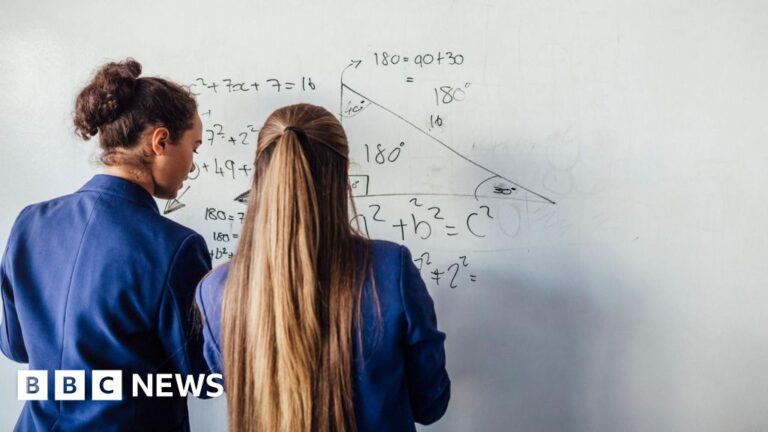Exam results day can be tough for everyone, but especially if you’re neurodivergent, meaning your brain works differently to others, sometimes as a result of conditions like autism or ADHD.
Paddy, 20, from Worcestershire, says that whilst sitting his A-levels, his anxiety was “massively heightened” by his obsessive-compulsive disorder (OCD). He is passionate about politics and volunteers for mental health charity Young Minds, now sharing his experience to help others.
Paddy says his parents were “incredibly worried” about him at the time, and before one of his exams he broke down crying “uncontrollably”. The pressure of exams affected his sleep and eating, and heightened his OCD symptoms, he says.
On the day itself, he made sure he had plans, so whatever the results were, he wouldn’t have to sit at home and worry. Now Paddy says he looks back with “so much pride”, because “whatever happened, whatever my grades were, I survived a really, really difficult period of my life”.
He was very happy with his final A-level grades – two A*s and an A – but now wonders at what cost. He says he wishes he had taken more time to relax and be “kinder to myself”, which he thinks may have put him in a calmer position.
Having been through it with his counsellor, he wants others to remember that “you’re so much more than some numbers on a piece of paper”.
Lotte, 22, from Peterborough, who is autistic, loves reading and colouring and has just completed a Level 3 course in creative media. Five years ago, around the time Lotte took her GCSEs, she was struggling with her mental health and had ended up in hospital – a moment of crisis which led to her getting more support in school, allowing her to stay in education for longer.
After completing her media course, Lotte is excited to pursue a career in marketing either through university, an apprenticeship, or heading straight into a job. But she says results day can bring “massive pressure”, and that the unpredictability of it can be “really scary” for autistic people.
Jolanta Lasota, chief executive of Ambitious about Autism, agrees that the uncertainty of results day can be “particularly stressful” for young autistic people. She says parents and carers can do a number of things to support them, including planning for a range of scenarios, avoiding vague phrases like “don’t worry” when trying to reassure, and looking at alternative ways of getting results, like doing so online.
Lotte says she did go to school to collect her results, as she wanted to see her friends and teachers, and confirm her place at sixth form. But she adds that it can be a really difficult environment, due to people’s heightened emotions and noisy, crowded spaces.
Overall, Lotte wants others with autism to remember that “doing these exams is already a massive achievement”. “Find time to look after yourself and remember the results are personal to you,” she says. “Try not to compare yourself with other people, because other people don’t know the struggles you’ve had.”
Stefano, 19, is from London and has just finished his first year at Warwick University. He enjoys campaigning on different issues, such as mental health. Stefano says this year has been a chance to “catch up on some fun which I needed to have in previous years”.
About a month before his A-level exams last year, Stefano says he collapsed at school due to burnout. Despite having a “supper supportive” network, Stefano says the system and pressure of A-levels simply became too much.
He’s noticed a marked improvement this year, where at university some of his exams have been open book, which he says he has preferred to his assessments at school. Stefano is neurodivergent and says this can make the exam period more challenging.
Leading up to results day, he managed his nerves by getting organised with different clearing options and the school’s phone number, had he needed them. He says his advice for others is to remember that “it’s your moment”, and if you do need to go into school or college, make sure you’re ready to do that and have as much information beforehand as you can.
Afterwards, he suggests having people around you, no matter the result. “Go to your community – whether it be your family, your friends or your school,” he says.
When asked about the challenges some young people face because of exams, a government spokesperson said they play an important role in maintaining a fair and trusted qualifications system, and that the curriculum and assessment review will “ensure young people leave education ready for work, and ready for life”.
Stevie Goulding, from Young Minds, has three top tips for parents and carers on results day.
1. Reflection – Start to speak about results day, what feelings are there? She encourages having open conversations about how they would like results day to go.
2. Validation – Stevie says sometimes the best solution is to fight the “overriding urge” to start problem solving, adding that it’s really important to let that young person sit with their emotions, however they’re feeling.
3. Reassurance – Alongside validation, reassurance is very important on results day, Stevie says. Asking what support they need, what will help them today, and what that support might look like can be really beneficial, Stevie adds.
Source link




